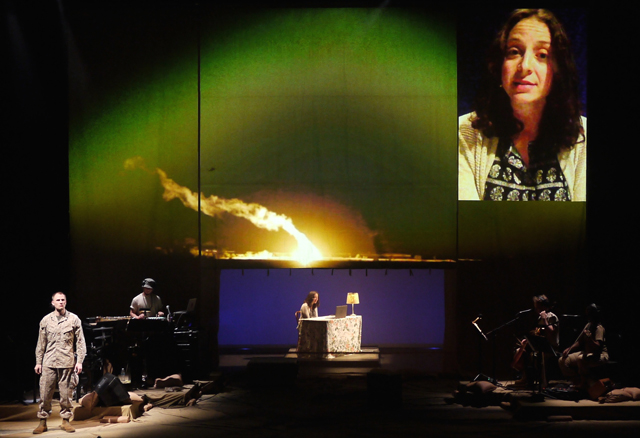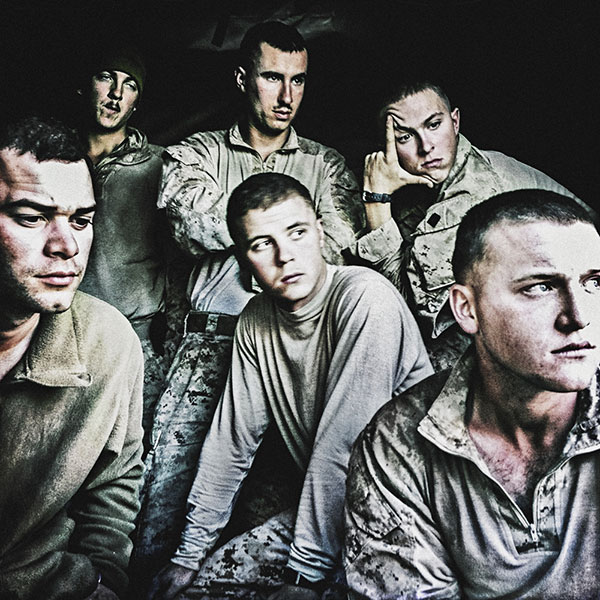
Veterans’ stories: How culture can help in healing
By Anne Tschida, Miami arts blogger
Too often we put arts and culture into a box, where we view it as a confined activity, something that happens for a couple hours on a stage or in a museum. That is far too limiting: Cultural expressions define us, and indeed can open doors, facilitate dialogues and even help in healing wounds and rifts like no other vehicle.
A perfect example is Basetrack, which started as an interactive war photography website funded by the Knight News Challenge media innovation contest, and morphed into a much broader artistic endeavor. Part of it, Basetrack Live, will be performed on March 21 in South Miami-Dade. It can loosely be described as a play based on accounts of war veterans from Iraq and Afghanistan, of their experiences both during duty overseas and back here at home, using a mix of new media and powerful stories. While it is theater, all of the dialogue is verbatim, taken straight from the writings of veterans and their families.
But there is more to Basetrack. To accompany the performance (whose South Florida stop is funded by the Knight Arts Challenge), presenter MDC Live Arts has put together other events to help integrate the lives of veterans with those of the vast majority of Americans who have never experienced combat.
Basetrack Live. Photo by Balasz Gardi
This includes a photography exhibit at the Betsy Hotel in South Beach; a collaboration with public radio station WLRN for a series of images and stories; and a fascinating creative writing program called Live Arts Veterans’ Lab. The latter consists of workshops headed by Miami’s star writer/performer Teo Castellanos, which will culminate in an April performance during the O, Miami poetry festival.
One Iraq veteran who has been participating in the Veterans’ Lab is Anthony Torres, whose stories from his time working at the Abu Ghraib General Hospital during the darkest days of 2004 are included in Saturday’s Basetrack Live.
A native of Brooklyn, Torres is now studying at Barry University to get a master’s degree in social work. He wants to help others who are struggling with traumas. He still struggles to cope with his time in a war zone, and the Live Arts lab excited him from the beginning. As he and other vets worked through the wounds, emotionally and physically, through writing and talking, he says “the cathartic opportunity to share our stories” turned out to be “sheer joy.”
The post-military reintegration process, Torres said, is difficult for everyone, for family members and for the civilian population that tries, but often can’t, understand. Every Saturday of late, the vets and Castellanos have been rehearsing the spoken-word piece that will premiere on April 19, another activity that Torres underscores has been a healing one.
Torres hopes that the play and the spoken-word performance will kick-start a much-needed dialogue with the wider community, so that veterans won’t feel so isolated, and so that others will want to open up and let them in.
A photograph from “Balasz Gardi: Basetrack 1-8,” currently on display at The Betsy Hotel.
With so many former military now residing in South Florida, Basetrack Live might have a particular resonance. The power of the storytelling, the inclusion of Teo Castellanos and the artistic guidance of MDC Live Arts Director Kathryn Garcia, is what stood out most to Knight Foundation’s VP for Arts, Dennis Scholl.
“Getting Teo involved was such a thoughtful decision,” Scholl said. “He is such a talented storyteller.”
Garcia, Scholl continues, could grasp the power of this storytelling, which is why her Challenge application jumped out immediately to him. “It felt like it was an unexplored story,” he said. “We have all these honorable veterans here, who still are a ‘silent’ minority to many of us. Culture has a way of examining this, and it’s of incredible value.”
When Torres first signed up for the military in 1999, he “wanted to expand my career, to travel.” In a pre-Iraq War America, he couldn’t have known what he would face, nor the terribly “hostile environment” he would have to survive five years later–a time he still has a hard time expressing verbally.
But Basetrack has felt like therapy to him, and we all are invited to now be part of the healing process.
Basetrack Live will take place at 8 p.m. on March 21 at the South Miami-Dade Cultural Arts Center, 10950 S.W. 211th St., Miami; 786-573-5300 (box office). Tickets are $35 ($10 for students), but admission is free for local veterans with proof of service. The “Balazs Gardi: Basetrack 1-8” photo exhibition will run through May at The Betsy Hotel, 1440 Ocean Dr., Miami Beach. Admission is free. The Live Arts Veterans’ Lab showcase will take place at 3 p.m. on April 19 at the Carlton Hotel, 1433 Collins Ave., Miami Beach. Admission is free.
Recent Content
-
Artsarticle ·
-
Artsarticle ·
-
Artsarticle ·

